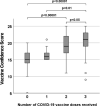Is vaccine confidence an unexpected victim of the COVID-19 pandemic?
- PMID: 36333226
- PMCID: PMC9618445
- DOI: 10.1016/j.vaccine.2022.10.061
Is vaccine confidence an unexpected victim of the COVID-19 pandemic?
Abstract
Vaccines are among the safest and most effective primary prevention measures. Thanks to the synergistic global efforts of research institutions, pharmaceutical companies and national health services, COVID-19 vaccination campaigns were successfully rolled out less than a year after the start of the pandemic. While the unprecedented speed of development and approval of COVID-19 vaccines has been applauded as a public health success story, it also spurred considerable controversy and hesitancy even amongst individuals that did not previously hold anti-vaccination stances. This study aimed to compare pre- and post-pandemic vaccine confidence trends in different demographic groups by analysing the outcomes of two online surveys run respectively in November 2019 and January 2022 involving a total of 1009 participants. Non-parametric tests highlighted a statistically significant decline in vaccine confidence in the 2022 cohort compared to the 2019 cohort, with median Vaccine Confidence Score dropping from 22 to 20 and 23.8% of participants reporting that their confidence in vaccines had declined since the onset of the pandemic. While the majority of internal trends were comparable between the two surveys with regards to gender, graduate status and religious belief, vaccine confidence patterns showed considerable alterations with regards to age and ethnicity. Middle-aged participants were considerably more hesitant than younger groups in the 2019 cohort, however this was not the case in the 2022 survey. In both surveys White participants showed significantly higher vaccine confidence than those from Black backgrounds; in the 2022 cohort, unlike the pre-pandemic group, Asian participants showed significantly lower confidence than White ones. This study suggests that paradoxically, despite the success of COVID-19 vaccination campaigns, vaccine confidence has significantly declined since the onset of the pandemic; the comparison of a pre- and post-pandemic cohort sheds light on the differential effect that the pandemic had on vaccine confidence in different demographic groups.
Keywords: COVID-19; Demographics; Survey; Vaccine confidence; Vaccine hesitancy.
Copyright © 2022 The Authors. Published by Elsevier Ltd.. All rights reserved.
Conflict of interest statement
Declaration of Competing Interest The authors declare that they have no known competing financial interests or personal relationships that could have appeared to influence the work reported in this paper.
Figures








References
-
- World Health Organization. Vaccines and immunization; 2022.
-
- Plotkin SL, Plotkin SA. A short history of vaccination. Vaccines 2004;5:1–16.
-
- Falcaro M., Castañon A., Ndlela B., Checchi M., Soldan K., Lopez-Bernal J., et al. The effects of the national HPV vaccination programme in England, UK, on cervical cancer and grade 3 cervical intraepithelial neoplasia incidence: a register-based observational study. Lancet. 2021;398:2084–2092. doi: 10.1016/S0140-6736(21)02178-4. - DOI - PubMed
-
- Wakefield A.J., Murch S.H., Anthony A., Linnell J., Casson D.M., Malik M., et al. Elsevier; 1998. RETRACTED: Ileal-lymphoid-nodular hyperplasia, non-specific colitis, and pervasive developmental disorder in children. - PubMed
MeSH terms
Substances
LinkOut - more resources
Full Text Sources
Medical

